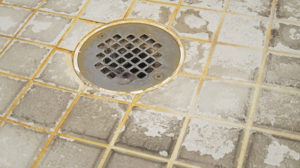HARD WATER HEADACHES: SOLUTIONS FOR THE TOUGHEST GRIME
We’ve all seen it. That white grime that sticks to our shower walls, bath & kitchen sinks, and all of our faucets and fixtures near water. We clean and scrub until our knuckles are white and our backs are aching, but to no avail. What causes this headache and how can it be fixed? Well, the culprit is hard water, and although this filthy residue CAN be cleaned, unfortunately, there’s not quite an “easy fix” to the problem. There are however many solutions that you can try which will work, and which we have listed here, but first, let’s start from the top.
What is hard water exactly? Hard water is water that has an extremely high mineral content of calcium and magnesium. When water is left sitting on a surface, like water drops on your shower door after you have just taken a shower or on your sink faucet after you wash your hands, the calcium and magnesium in the water harden to form a rock-hard film or debris that looks a lot like soap scum. It often makes these surfaces look grimy and filthy no matter how often or how hard you clean them, and although hard water generally is not harmful to one’s health, it can often pose serious problems to the plumbing in your home and to certain household appliances as well. A few unseen problems, such as slow-building drain clogs & low-water pressure in showers and faucets, are just a few of the many problems, aside from that filthy-looking residue, that hard water causes.
As mentioned before, and if you’ve already tried, you know that hard water is not the easiest to clean, and the longer the buildup remains, the more hard water buildup piles on, and the harder it is to clean. So, before you call a professional and spend a lot of money, why not try a few of these solutions yourself:
Cleaning hard water deposits on shower doors, tile, faucets, countertops, etc
- Industrial cleaners- which are made from certain chemicals can be used to break apart the scaly deposits and make it easier to wash them away.
- High-pressure steamers- the high-pressure steam causes the residue to loosen and then fall off these surfaces.
- High-pressure washers– the high-pressure washers harshly break apart the residue and wash it away; however, extreme caution needs to be taken with this method, as the high pressure of the water can often tear apart the surface causing even further damage and sometimes necessary replacement.
- Muriatic acid- can be diluted and sprayed on to hard water crust to wash it away, but make sure that it is being used in a well-ventilated area, and is stored away from chlorine, as it will become explosive.
- White vinegar- sprayed on or poured on to the surface, the vinegar begins to break apart these deposits. Letting it set for a minimum of ten minutes, and taking a toothbrush to the surface after it has finished setting will greatly help the process, and then just wash it away.
Cleaning hard water deposits in fixtures and appliances
- Low water pressure in shower and sink faucets– often caused by hard water buildup inside of the faucet, it can easily be cleaned by submerging the faucet in vinegar for 6-8 hours. Taking apart a fixture isn’t always the easiest thing to do, so to make things easier, try filling a small sandwich-sized baggie with vinegar and putting the baggie over the faucet so the facet is completely submerged in the vinegar. Tie the baggie into place by using a rubber band and leave it to set overnight or for at least 6-8 hours. This will break down the mineral build-up and clear the holes that caused the pressure to backup.
- Coffee makers, teapots, and other pots and pans- pour white vinegar directly into your coffee maker and run as usual. It might take more than one cycle to get the water spots to come clean, but after a few runs, it should be looking pretty clean and clear. Calcium deposits in teapots and kettles can also be removed by bringing 2 cups of vinegar to boil, let set for 10 minutes, and then wash well. Same with other pots and pans.
- Dishwashers and washing machines- Pour 2 cups of vinegar directly into your dishwasher and run through a short cycle to clean the interior and hoses of the washer, or pour 2 cups of vinegar down the bleach dispenser of your washing machine and run a small cycle to clean the interior and hoses of that washer.
If hard water still remains a problem, give us a call at (855) 327-0885 or contact us online. These parts might need to be replaced to prevent any further problems deeper within these systems. General maintenance of hard water spots and residue is key, whether it is weekly, bi-weekly, or even monthly. Hard water shouldn’t be a headache, so keep on top of it by using these solutions to help you relieve this headache once and for all!

